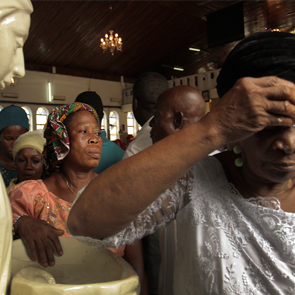The head of the Catholic Church in Nigeria has challenged the country’s new president-elect, Muhammadu Buhari, to tackle corruption and bring down the Islamic terrorist organisation Boko Haram.
Cardinal John Onaiyekan, the Archbishop of Abuja, said that the elections yesterday had been more transparent than in previous years but warned that stability could only be restored by dealing with the insurgency.
“We have a very bad record on corruption … and there’s no doubt this is pulling our nation down,” he told Vatican Radio.
Both he and the National President of the Christian Association of Nigeria (CAN) Pastor Ayo Oritsejafor sent congratulations to the president-elect.
Muhammadu Buhari, a 72-year-old Muslim from and ex-military ruler from the north, defeated incumbent Goodluck Jonathan, a 57-year-old Christian from the south, by about 2 million votes in the election yesterday. He will be sworn in on 29 May.
On Sunday, Christians attended Palm Sunday services during which they prayed for a peaceful elections outcome. In 2011, about 800 people were killed when Mr Jonathan defeated Mr Buhari.
Tensions surrounding the election were mixed with relief that most of the North, where Boko Haram terrorists have murdered thousands, was able to participate. “The elections were held in a calm manner in Maiduguri, without violence or crisis caused by Boko Haram,” reported Bishop Oliver Dashe Doeme of Maiduguri, capital of Borno State and one of the areas most affected by the violence. “Despite the attacks by Boko Haram in different locations, mostly rural, in northern Nigeria, which unfortunately caused several victims, the Islamist sect failed to prevent the holding of elections in most of Nigeria.”
“We are waiting anxiously for the results, but we thank God by and large the elections were peaceful. We hope the contenders will have the will and maturity to accept the results,” Fr John Bakeni, the secretary of the Maiduguri diocese told The Tablet.
Bishop Doeme said the only serious problem was that card readers failed to recognise the fingerprints of voters.
On the election eve more than 80 per cent of the areas controlled by Boko Haram were recaptured by the Nigerian army. “Why was it not done before, if our military had the ability to hunt Boko Haram?” asked Fr Patrick Tor Alumuku, Director of Social Communications of the Archdiocese of Abuja.
Skirmishes between Boko Haram and the army did disrupt voting in some areas and at least 41 people were reported killed, and it is not clear how many of the North’s one million displaced people voted. However, the UN Secretary General Ban Ki-moon praised the “determination and resilience” of Nigerian voters.
Above: Nigerians attend Palm Sunday Mass in Port Harcourt, Nigeria, 29 March and pray for peace around the outcome of presidential elections that were taking place. Photo: CNS photo/Tife Owolabi, EPA




 Loading ...
Loading ...